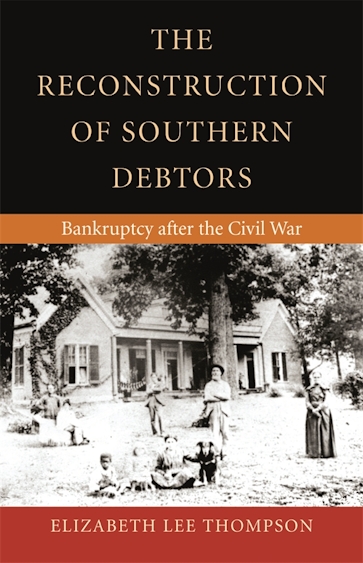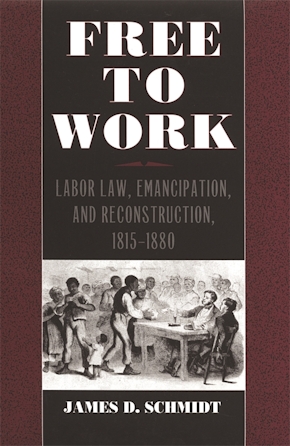The Reconstruction of Southern Debtors
Bankruptcy after the Civil War
Title Details
Pages: 222
Illustrations: 9 figures
Trim size: 6.000in x 9.000in
Formats
Hardcover
Pub Date: 08/31/2004
ISBN: 9-780-8203-2624-5
List Price: $48.95
The Reconstruction of Southern Debtors
Bankruptcy after the Civil War
Skip to
- Description
- Reviews
Based on a careful empirical study of nearly four thousand cases filed in three southern federal districts, this book focuses on how the Bankruptcy Act of 1867 helped shape the course and outcome of Reconstruction. Although passed by a Republican-dominated Congress that was commonly viewed as punitive toward the post-Civil War South, the Bankruptcy Act was a great benefit to southerners. In this first study of the operation of the 1867 Act, Elizabeth Lee Thompson challenges previous works, which maintain that nineteenth-century southerners uniformly opposed federal bankruptcy laws as threatening extensions of federal power. To the contrary, Thompson finds that southerners, faced with the war’s devastation, were more likely to file for bankruptcy than debtors in other parts of the country. The Act thus was the major piece of federal economic legislation that benefited southerners during Reconstruction.
Thompson determines that because the vast majority of the Bankruptcy Act’s southern beneficiaries were propertied white men, the legislation served to stabilize and entrench the postwar economic—and thus social and political—power of the sector that included those who were recently leading secessionists and Confederates. Their participation in a federal process, through federal tribunals, during an era of intense white southern opposition to policies emanating from Washington reveals the complex interaction of states' rights ideology and self-interest. However, Thompson shows, white southerners ultimately sacrificed neither in relation to the Bankruptcy Act. After thousands had received economic relief through the statute and the number of filings had slowed to a trickle, southern congressmen supported the Act’s repeal in 1878.
Thompson clarifies the complex and intimate links between post-Appomattox bankruptcy policies, race-equality-focused Reconstruction, and the swift renewal of southern whites' domination of their states.
—Harold Hyman, William P. Hobby Professor Emeritus of History, Rice University
It is known that sometimes narrow topics may yield illuminating interpretations. Such is the case with Elizabeth Lee Thompson's study of the Bankruptcy Act of 1867. It has much to tell us about southerners and states' rights, the immediate debt problem of the postbellum South, the ideological constraints operating on Republican congressmen, the gendered quality of mid-nineteenth-century legislation, and the timing of the end of Reconstruction. This is a fine contribution to the history of Reconstruction.
—James L. Huston, author of Calculating the Value of the Union: Slavery, Property Rights, and the Economic Origins of the Civil War
This is a tightly argued, intensively researched book. . . . The strength of this book is its ability to deal effectively with its chosen topic. . . . Its usefulness comes through its suggestions of importat connections with other recent works on debt and bankruptcy and on the economy of the South. Its promise lies in its reflection of an historian capable of giving life to what was once an arcane and obscure topic.
—Jonathon M. Chu, Civil War Book Review
Lucid and fascinating . . . The Reconstruction of Southern Debtors is a welcome addition to Reconstruction historiography. Thompson . . . Sheds new light on why Radical Republicans failed to fundamentally transform the South's economic, social, and political hierarchy during Reconstruction.
—Florida Historical Quarterly
This study of the Bankruptcy Act of 1867 is a welcome contribution to both Reconstruction-era historiography and southern legal history . . . The Reconstruction of Southern Debtors is a well-written study of a neglected topic in Reconstruction historiography. The strength of this book is Thompson’s ability to shed light on a significant piece of economic legislation that Reconstruction scholars have omitted from the historiography
—Southern Historian
Thompson’s book adds an interesting and new dimension to this familiar story [of Reconstruction].
—American Historical Review
Carefully crafted . . . This book makes an invaluable contribution to our understanding of Reconstruction. . . . Thompson writes in a clear and accessible style, and she very commendably avoids burdening the reader with legal jargon.
—Journal of American History
Well grounded in thorough research.
—Paul D. Escott, Civil War History



